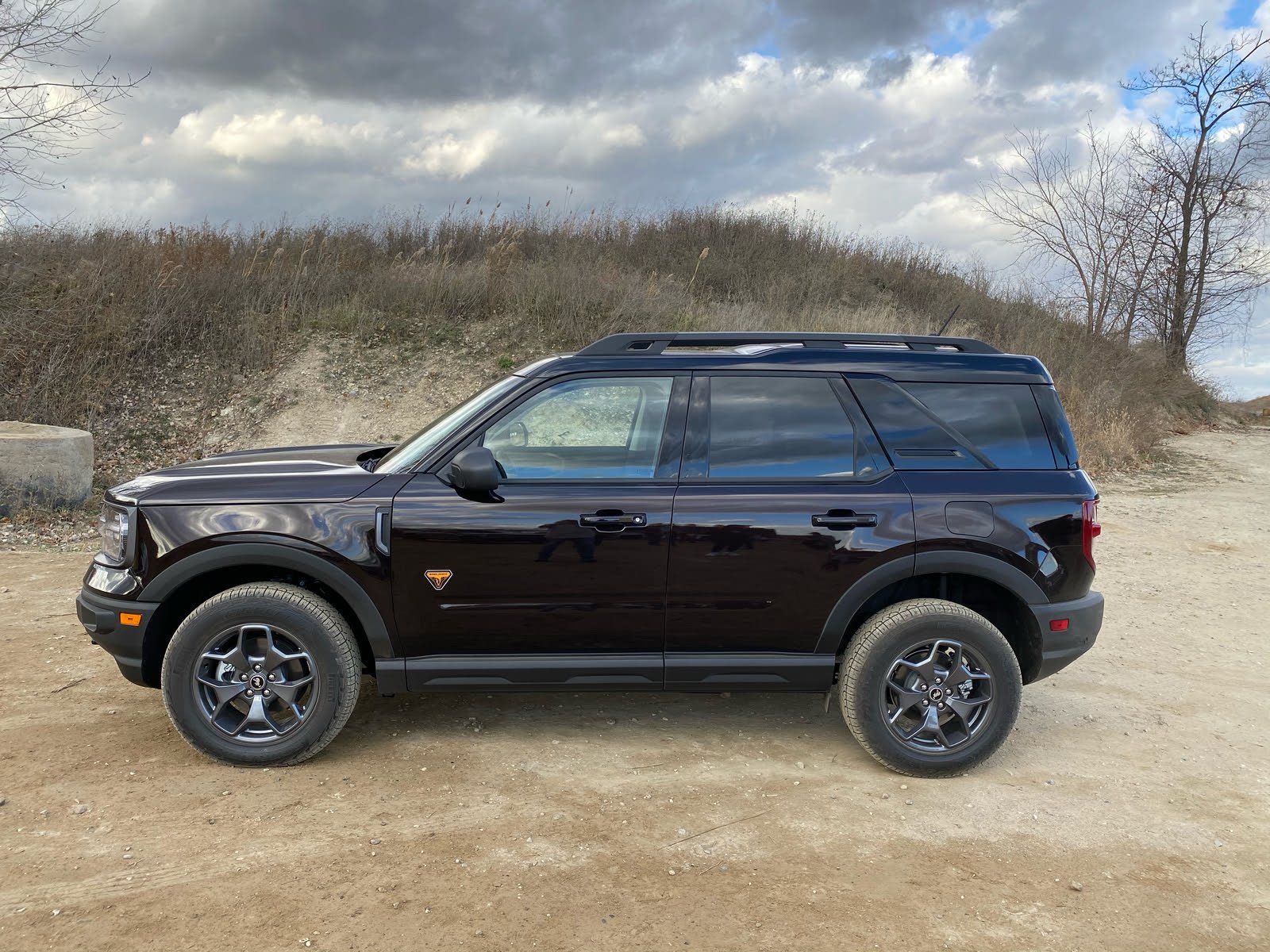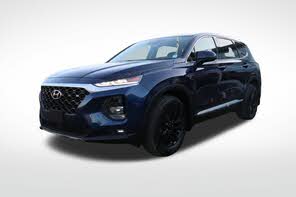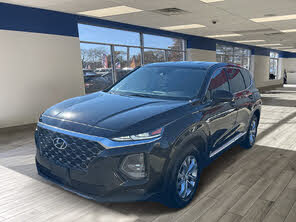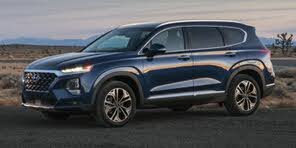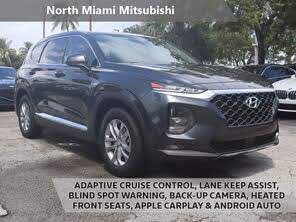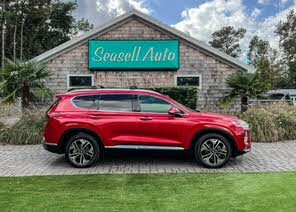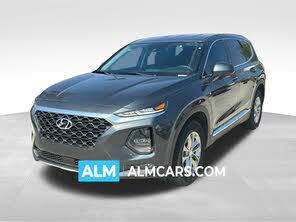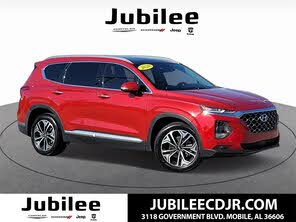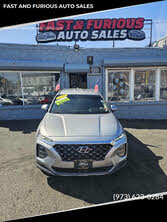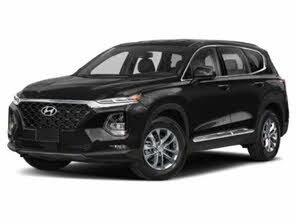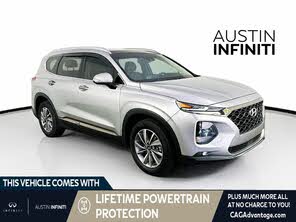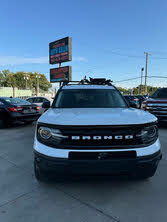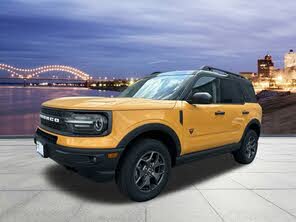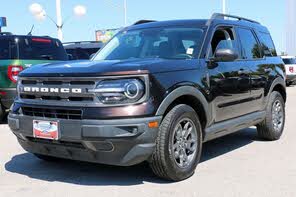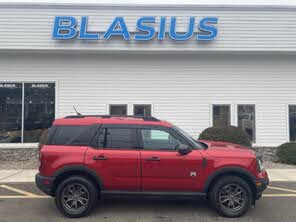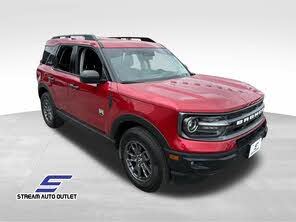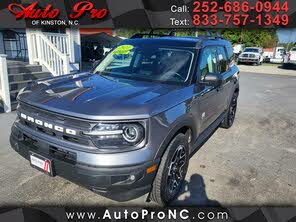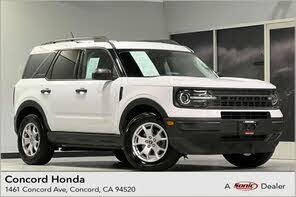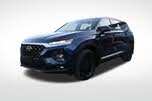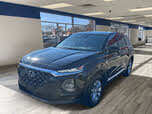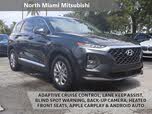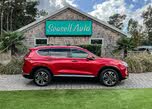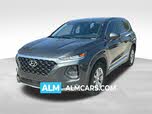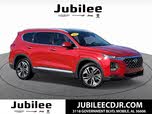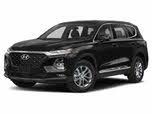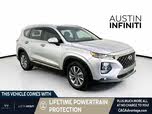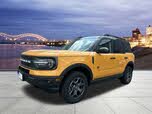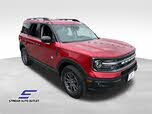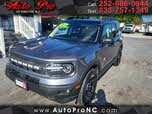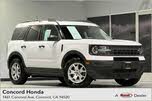2020 Hyundai Santa Fe vs 2021 Ford Bronco Sport
CarGurus highlights
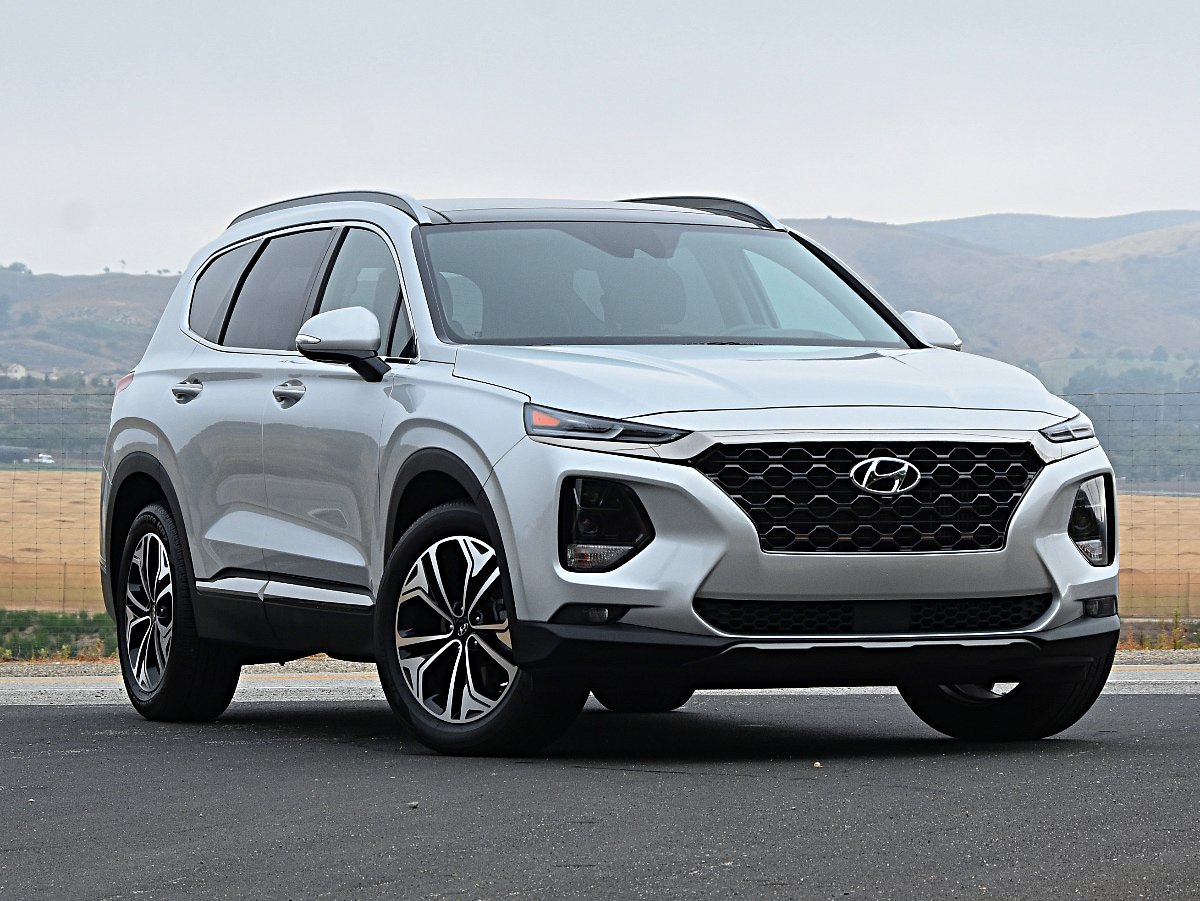
According to CarGurus experts, the overall rating for the 2020 Hyundai Santa Fe is 8.8 out of 10, while the 2021 Ford Bronco Sport scores 7.3 out of 10. Based on these ratings, the 2020 Hyundai Santa Fe is the recommended choice, offering a higher overall rating, superior safety features, and a more comfortable and refined driving experience.
Choose the 2020 Hyundai Santa Fe if:
- You prioritize a high safety rating and advanced safety features.
- You appreciate a comfortable and quiet ride with thoughtful interior details.
- You want a user-friendly infotainment system with extensive connectivity options.
Choose the 2021 Ford Bronco Sport if:
- You need a vehicle with strong off-road capabilities and versatile G.O.A.T. modes.
- You require ample cargo space and clever storage solutions for active lifestyles.
- You prefer the latest infotainment technology and a rugged, modern design.
Overview | |
MSRP$26,275 | MSRP$27,215 |
Average price$20,429 | Average price$24,795 |
Listings1129 | Listings2678 |
Ratings & Reviews | |
User Reviews | User Reviews |
Expert reviews8.8 out of 10 | Expert reviews7.3 out of 10 |
Pros
| Pros
|
2020 Hyundai Santa Fe Reviews SummaryLast year, Hyundai changed its approach to the Santa Fe. The smaller five-passenger Santa Fe Sport got drop-kicked from the automaker’s lineup, replaced by this completely redesigned version of the SUV. The larger seven-passenger Santa Fe got a new name for one year (Santa Fe XL), and then the all-new 2020 Hyundai Palisade replaced that vehicle. With the Palisade’s arrival, there is just one Santa Fe for 2020, a five-passenger crossover that resides in a sweet spot between traditional compact and midsize models. It gets several updates, too, including a standard rear-seat reminder system, an available camera-based Blind-Spot View Monitor system, and new design accents to better distinguish the top trim level. | |
2021 Ford Bronco Sport Reviews SummaryAfter a long buildup, Ford finally made the 2021 Bronco Sport available for the media to test drive. The spunky compact two-row crossover SUV proved to be a lively, capable, and attractive companion for on- and off-pavement adventures. | |
Popular Features & Specs | |
Engine2.4L 185 hp I4 | Engine1.5L 181 hp I3 |
Drive TrainFWD | Drive TrainAWD |
Seating Capacity5 | Seating Capacity5 |
Horsepower185 hp @ 6000 rpm | Horsepower181 hp @ 6000 rpm |
MPG City22 | MPG City25 |
MPG Highway29 | MPG Highway28 |
Engine | |
Engine Name2.4L 185 hp I4 | Engine Name1.5L 181 hp I3 |
Torque178 lb-ft @ 4000 rpm | Torque190 lb-ft @ 3000 rpm |
Horsepower185 hp @ 6000 rpm | Horsepower181 hp @ 6000 rpm |
DrivetrainFWD | DrivetrainAWD |
Fuel Economy | |
MPG City22 | MPG City25 |
MPG Highway29 | MPG Highway28 |
Interior | |
Seating Capacity5 | Seating Capacity5 |
Safety | |
Front Crash Overall4 | Front Crash Overall5 |
Side Crash Overall5 | Side Crash Overall5 |
Dimensions & Capacity | |
Cargo Space35.9 cu ft | Cargo Space32.5 cu ft |
Curb Weight3591 lbs | Curb Weight3457 lbs |
Height66.1 in | Height70.2 in |
Length187.8 in | Length172.7 in |
Width74.4 in | Width82.2 in |
Wheelbase108.9 in | Wheelbase105.1 in |
Maximum Payload1138 lbs | Maximum Payload1171 lbs |
Number of doors4 | Number of doors4 |
Maximum Towing Capacity2000 lbs | Maximum Towing Capacity |
CarGurus highlights

According to CarGurus experts, the overall rating for the 2020 Hyundai Santa Fe is 8.8 out of 10, while the 2021 Ford Bronco Sport scores 7.3 out of 10. Based on these ratings, the 2020 Hyundai Santa Fe is the recommended choice, offering a higher overall rating, superior safety features, and a more comfortable and refined driving experience.
Choose the 2020 Hyundai Santa Fe if:
Shop Now- You prioritize a high safety rating and advanced safety features.
- You appreciate a comfortable and quiet ride with thoughtful interior details.
- You want a user-friendly infotainment system with extensive connectivity options.
Choose the 2021 Ford Bronco Sport if:
Shop Now- You need a vehicle with strong off-road capabilities and versatile G.O.A.T. modes.
- You require ample cargo space and clever storage solutions for active lifestyles.
- You prefer the latest infotainment technology and a rugged, modern design.
Overview | ||
MSRP | $26,275 | $27,215 |
Average price | $20,429 | $24,795 |
Listings | ||
Ratings & Reviews | ||
User reviews | 4.5 | 4.3 |
Expert reviews | 8.8 out of 10Read full review | 7.3 out of 10Read full review |
Pros & cons | Pros
| Pros
|
Summary | Last year, Hyundai changed its approach to the Santa Fe. The smaller five-passenger Santa Fe Sport got drop-kicked from the automaker’s lineup, replaced by this completely redesigned version of the SUV. The larger seven-passenger Santa Fe got a new name for one year (Santa Fe XL), and then the all-new 2020 Hyundai Palisade replaced that vehicle. With the Palisade’s arrival, there is just one Santa Fe for 2020, a five-passenger crossover that resides in a sweet spot between traditional compact and midsize models. It gets several updates, too, including a standard rear-seat reminder system, an available camera-based Blind-Spot View Monitor system, and new design accents to better distinguish the top trim level. | After a long buildup, Ford finally made the 2021 Bronco Sport available for the media to test drive. The spunky compact two-row crossover SUV proved to be a lively, capable, and attractive companion for on- and off-pavement adventures. |
Video | ||
Popular Features & Specs | ||
Engine | 2.4L 185 hp I4 | 1.5L 181 hp I3 |
Drive Train | FWD | AWD |
Seating Capacity | 5 | 5 |
Horsepower | 185 hp @ 6000 rpm | 181 hp @ 6000 rpm |
MPG City | 22 | 25 |
MPG Highway | 29 | 28 |
Engine | ||
Engine Name | 2.4L 185 hp I4 | 1.5L 181 hp I3 |
Torque | 178 lb-ft @ 4000 rpm | 190 lb-ft @ 3000 rpm |
Horsepower | 185 hp @ 6000 rpm | 181 hp @ 6000 rpm |
Drivetrain | FWD | AWD |
Fuel Economy | ||
MPG City | 22 | 25 |
MPG Highway | 29 | 28 |
Interior | ||
Seating Capacity | 5 | 5 |
Safety | ||
Front Crash Overall | 4 | 5 |
Side Crash Overall | 5 | 5 |
Dimensions & Capacity | ||
Cargo Space | 35.9 cu ft | 32.5 cu ft |
Curb Weight | 3591 lbs | 3457 lbs |
Height | 66.1 in | 70.2 in |
Length | 187.8 in | 172.7 in |
Width | 74.4 in | 82.2 in |
Wheelbase | 108.9 in | 105.1 in |
Maximum Payload | 1138 lbs | 1171 lbs |
Number of doors | 4 | 4 |
Maximum Towing Capacity | 2000 lbs | |
When shopping for a new 2020 Hyundai Santa Fe, buyers chose between SE, SEL, and Limited trim levels. Versions with a “2.0T” in the trim name received a power and performance upgrade courtesy of a turbocharged engine. All-wheel drive (AWD) was an option, allowing the automatic transmission to transfer power from the front wheels to the rear wheels when necessary. Aside from deciding about AWD, a turbocharged engine, and—if you were getting the SEL—an optional Convenience Package, buyers picked a paint color, interior color, and upgrades from a shortlist of dealer-installed accessories. The test vehicle had Limited 2.0T trim and a set of dealer-installed floor mats, bringing the price to $39,170.
The Santa Fe's design was an acquired taste, with Hyundai's bold experimental approach resulting in a grille shape, stacked front lighting elements, asymmetrical fender stampings, and oversized rear “skid plate” trim that didn’t work for everyone. The interior, however, had a sense of drama with a dual-cowl dashboard design, diamond-textured speaker grilles, and high-contrast visual elements in gray or beige interiors. Despite the high-style design, materials quality was somewhat lacking, with glossy plastic and stiff leather seat upholstery. Nevertheless, build quality was exceptionally good, and the controls operated with refinement.
Ford had been teasing the new Bronco for years, and the 2021 Ford Bronco Sport was revealed as a precursor to the resurrected off-roader. The Bronco Sport captured some of the same styling cues as its big brother but was a frameless (unibody) crossover with a more suburban focus. It had a modern retro feel that wouldn’t be out of place in the Land Rover lineup. The front overhang was very short, and the rear overhang was almost as good, designed for trail driving with minimal unnecessary adornment. The front end echoed the Bronco, and bold white lettering on the grille and tailgate announced the vehicle’s name as “BRONCO,” with a smaller postscript admitting “SPORT.” The Ford blue oval appeared only once on the exterior, a modest badge on the tailgate.
Wheels played a big part in the Bronco Sport’s look and off-road ability. The Base model came with 17-inch Sparkle Silver wheels, while the Big Bend model got 17-inch Carbonized Gray-painted high-gloss aluminum wheels. Outer Banks stepped up to 18-inch machined-face aluminum Ebony Black-painted wheels with all-season tires, while the Badlands model used the same wheels but with 28.5-inch all-terrain tires. The First Edition model came with 17-inch Ebony Black-painted wheels and 29-inch all-terrain tires. The interior was tastefully rugged, with an uncluttered design, unique HVAC vent shapes, and convenient storage cubbies. The center stack was crowned by an 8-inch infotainment screen, and a rotary gear selector lived in the center console.
The 2020 Hyundai Santa Fe had a minimum curb weight of 3,591 pounds and a maximum of 3,946 pounds. The standard 185-horsepower 2.4-liter four-cylinder engine was not the preferred choice. Instead, the 2.0T trim installed a turbocharged 2.0-liter four-cylinder engine, making 235 hp and 260 lb-ft of torque between 1,450 rpm and 3,500 rpm. These figures represented increases of 50 hp and 82 lb-ft over the standard power plant, with torque available much faster after stepping on the gas pedal. The eight-speed automatic transmission funneled power to the front wheels unless the optional AWD system was chosen. Properly equipped, the Santa Fe had a towing capacity of 3,500 pounds. The EPA estimated a Santa Fe 2.0T front-driver to get 23 mpg in combined driving, and the test model returned 22.1 mpg.
The Santa Fe was quick, compliant, and communicative, with a smooth ride, decent handling, light-effort steering, and brakes that withstood some abuse. The Limited trim had laminated windshield and front window glass, making the highway ride nice and quiet. The Santa Fe handled moderate off-roading with ease but lacked driver engagement, making it more of a tool than a toy.
Ford set up a media drive at Holly Oaks ORV Park in Michigan, where several variants of the Bronco Sport were driven on groomed trails and designed obstacles, as well as on public roads. The Bronco Sport had two engine choices tied to trim levels. A 1.5-liter EcoBoost turbocharged three-cylinder engine producing 181 hp and 190 lb-ft of torque was fitted in Base, Big Bend, and Outer Banks trims. A 2.0-liter EcoBoost turbocharged four-cylinder engine putting out 245 hp and 275 lb-ft was available in the Badlands and First Edition models. All Bronco Sport models featured an eight-speed automatic transmission and AWD, along with a terrain management system with up to seven available G.O.A.T. modes.
The Bronco Sport performed well off-road, with a short wheelbase, four-wheel independent suspension, generous suspension travel, and decent ground clearance. On pavement, the crossover had good manners, with the 2.0-liter engine better suited to the Bronco Sport’s character. The 1.5-liter engine could sound strained when pressed hard.
The 2020 Hyundai Santa Fe had thoughtful attention to detail, with creative storage spaces and stain-resistant fabric in versions with cloth seats. The test vehicle had eight-way power-adjustable, heated, and ventilated front seats, with the driver’s seat including four-way power-adjustable lumbar support and an extending thigh support. The dual-zone automatic climate control system included a Clean Air ionizer, and the air conditioning was effective even with the massive panoramic glass sunroof. The back seat was comfortable for adults, with air conditioning vents, rear side-window sunshades, and heated bottom cushions. However, the Santa Fe fell short in cargo space, with 35.9 cubic feet behind the rear seat and a maximum of 71.3 cubic feet. Large storage compartments under the cargo floor were a positive note, and the hands-free “smart” liftgate was a convenient feature.
The 2021 Ford Bronco Sport delivered fun, clever features for active buyers. The cargo space was designed to hold two 27.5-inch-wheel mountain bikes, and Ford launched a catalog of over 100 accessories for transporting kayaks, surfboards, skis, and camping equipment. The roof was rated to hold up to 150 pounds (100 with moonroof), and the 2.0-liter engine could tow up to 2,200 pounds, while the 1.5-liter could tow 2,000 pounds. The cargo hold had additional smart features, including a flip-up rear glass, an optional cargo management package with a slide-out work table, a 400-watt inverter, and liftgate floodlamps. The front cabin had ample storage compartments, but taller drivers might find outward visibility challenging. The driving position could be improved for better trail visibility.
The 2020 Hyundai Santa Fe’s touchscreen infotainment system was a shining example of user-friendly technology. It had stereo control knobs, main menu shortcut buttons, and a programmable button. Every Santa Fe had Bluetooth connectivity and Apple CarPlay and Android Auto integration. The SEL trim added SiriusXM satellite radio, Blue Link connected services with three free years of service, remote engine starting, automatic emergency assistance, and more. The Limited trim added a larger 8-inch display, navigation, a surround-view camera, wireless smartphone charging, and a 12-speaker Infinity surround sound system. A head-up display provided data on the windshield, including blind-spot information.
The 2021 Ford Bronco Sport featured the latest versions of Ford’s infotainment systems. The 8-inch touchscreen connected to SYNC 3, compatible with Apple CarPlay and Android Auto, and had available Ford+Alexa and SiriusXM capability. FordConnect with 4G LTE WiFi hotspot was standard. The base audio system was an AM/FM stereo with six speakers, while a Bang & Olufsen sound system was available on higher trims. The terrain management system had up to seven G.O.A.T. modes, setting appropriate steering, transmission, and throttle response settings for different conditions. Trail control technology added a cruise-control-like feature for off-roading. Intelligent access with push-button start was included on all trims except Base, and higher trims had heated and leather-wrapped steering wheels and a 6.5-inch digital instrument panel.
The 2020 Hyundai Santa Fe earned a five-star overall crash-test rating from the National Highway Traffic Safety Administration (NHTSA) and a Top Safety Pick rating from the Insurance Institute for Highway Safety (IIHS). Every Santa Fe was equipped with adaptive cruise control, forward collision warning, automatic emergency braking, lane-departure warning, lane-keeping assistance, a driver monitoring system, and a rear-seat reminder system. The SEL trim added blind-spot warning, rear cross-traffic warning, and a safe exit assist system. The SEL Convenience Package included an ultrasonic occupant alert system tied to the Blue Link app, and the Limited trim had a Blind-Spot View Monitor.
Each trim level of the 2021 Ford Bronco Sport came standard with the Ford Co-Pilot360 suite of safety features, including pre-collision assist, automatic emergency braking, pedestrian detection, forward collision warning, blind-spot monitoring, rear cross-traffic alert, lane-keeping assist, auto high-beam headlamps, and a reversing camera. The Co-Pilot360 Assist+ package added adaptive cruise control, lane centering, evasive steering assist, a voice-activated touchscreen navigation system, SiriusXM Traffic and Travel Link, and road-sign recognition. Trailer sway control was included in the tow package, and AWD with a terrain management system was standard on all models. Neither the IIHS nor the NHTSA had revealed crash-worthiness ratings for the Bronco Sport yet.

By: CarGurus + AI
At CarGurus, our team of experienced automotive writers remain at the heart of our content operation, conducting hands-on car tests and writing insightful guides that are backed by years of industry experience. To complement this, we are harnessing AI to make our content offering more diverse and more helpful to shoppers than ever. To achieve this, our AI systems are based exclusively on CarGurus content, ratings and data, so that what we produce is both unique to CarGurus, and uniquely helpful to car shoppers.
